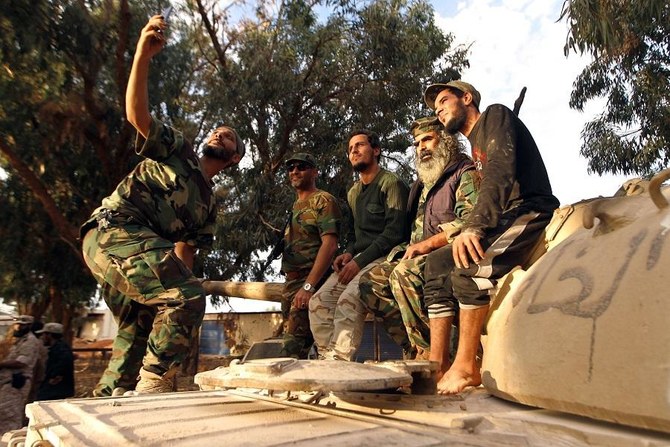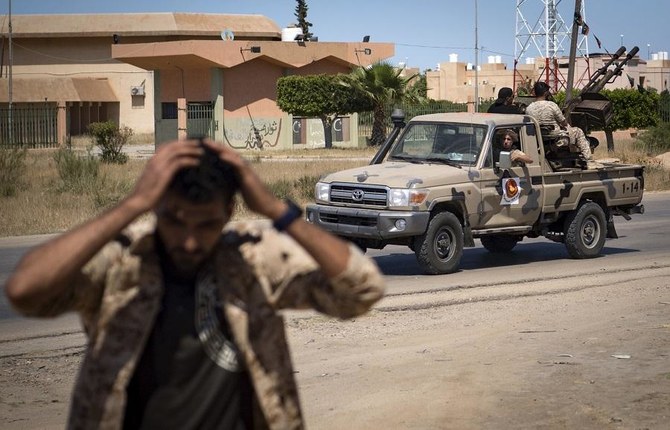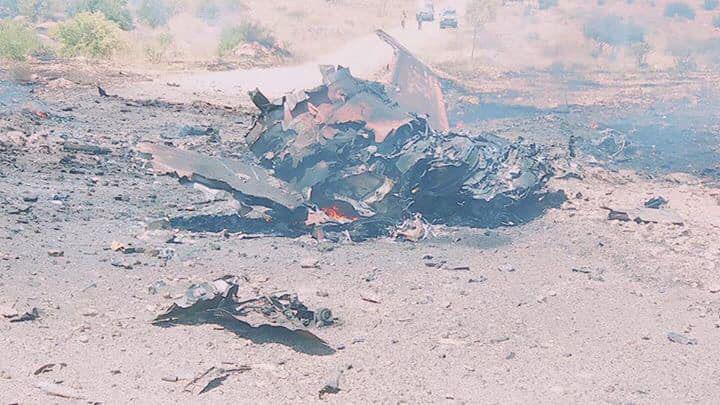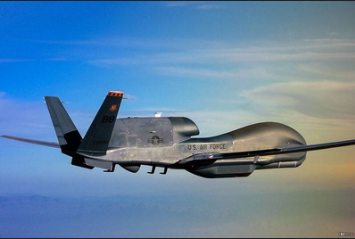angelburst29
The Living Force
Air strikes hit the Libyan capital late on Saturday as eastern forces loyal to Khalifa Haftar pursued a three-week campaign to take Tripoli and also confirmed for the first time they had dispatched a warship to an oil port.
April 27, 2019 - Air strike hits Tripoli as eastern Libyan forces send warship to oil port
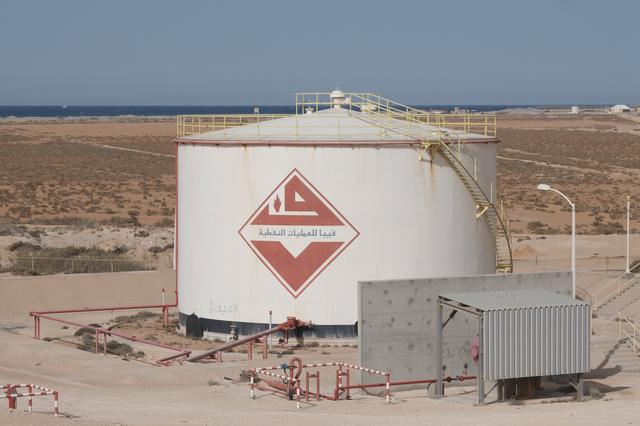
FILE PHOTO - An oil tank is seen inside Ras Lanuf port Oil and Gas Company in Ras Lanuf, Libya July 10, 2018. Picture taken July 10, 2018. REUTERS/Esam Omran Al-Fetori
The Libyan National Army (LNA) force of Haftar, which is allied to a parallel government, has repeatedly flown air strikes since starting an offensive three weeks ago to take the capital held by the internationally recognized government.
The air strikes came before the LNA had sent a warship to the eastern Ras Lanuf oil port, after days of unconfirmed rumors of a foreign navy ship having been sighted.
LNA spokesman Ahmed Mismari told reporters his forces had sent the Alkarama patrol vessel to Ras Lanuf in Libya’s key Oil Crescent region as part of a “training mission” to visit the operations room and to secure oil facilities.
The LNA last year had received the patrol vessel, which was previously owned by a firm with a postal address in the United Arab Emirates (UAE), according to U.N. report monitoring violations of an arms embargo on Libya.
A port engineer said the navy ship’s berthing had not affected oil exports which were going normally. It was not immediately clear whether the ship had left.
Libya's NOC says revenue up but fighting poses serious production risk
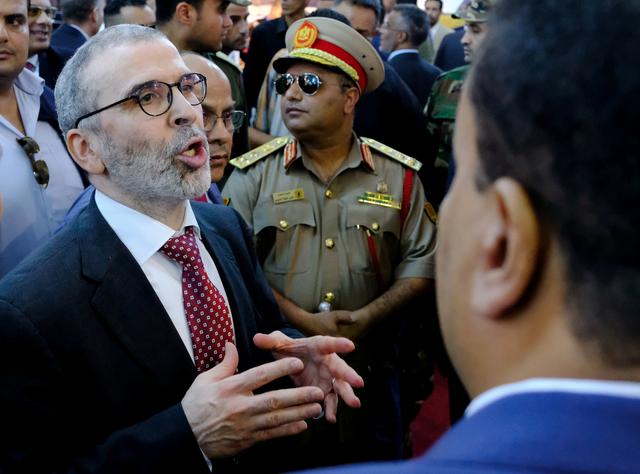
Libya's National Oil Corporation (NOC) said on Saturday that revenues rose to more than $1.5 billion in March, up 20 percent from the previous month, but that fighting between rival factions posed a serious threat to production.
Exclusive: Libya's U.N.-backed government readies new war funding but hopes vital business to continue
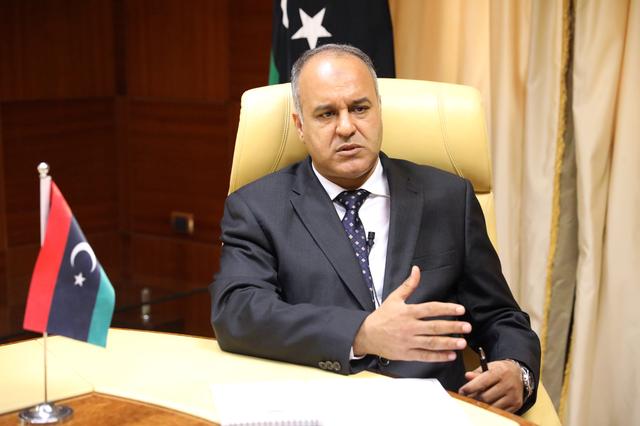
Libyan Minister of Economy Ali Abdulaziz Issawi speaks during an interview with Reuters in Tripoli, Libya April 25, 2019. REUTERS/Hani Amara
Libya's U.N.-recognized government has budgeted up to 2 billion dinars ($1.43 billion) to cover costs of a three-week-old war for control of the capital, such as treatment for the wounded, to be funded without new borrowing, the economy minister said.
Ali Abdulaziz Issawi suggested the government hoped for business to continue more or less as usual despite the assault on Tripoli, in the country’s northwest, by forces tied to a parallel administration based in the eastern city of Benghazi.
Once Africa’s third largest producer of oil, Libya has been riven by factional conflict since the fall of Muammar Gaddafi in 2011, with the country now broadly split between eastern-based forces under Khalifa Haftar and the U.N.-backed government in Tripoli, in the west, under Prime Minister Fayez al-Serraj.
Still, with Haftar’s Libyan National Army forces unable so far to pierce defenses in Tripoli’s southern suburbs, normal life and business activities continue in much of the capital and western coastal towns.
Issawi, in an interview with Reuters in his Tripoli office, also said Libya’s commercial ports and wheat imports were still functioning normally, although some roads have been blocked. (Article continues.)
April 27, 2019 - Air strike hits Tripoli as eastern Libyan forces send warship to oil port
FILE PHOTO - An oil tank is seen inside Ras Lanuf port Oil and Gas Company in Ras Lanuf, Libya July 10, 2018. Picture taken July 10, 2018. REUTERS/Esam Omran Al-Fetori
The Libyan National Army (LNA) force of Haftar, which is allied to a parallel government, has repeatedly flown air strikes since starting an offensive three weeks ago to take the capital held by the internationally recognized government.
The air strikes came before the LNA had sent a warship to the eastern Ras Lanuf oil port, after days of unconfirmed rumors of a foreign navy ship having been sighted.
LNA spokesman Ahmed Mismari told reporters his forces had sent the Alkarama patrol vessel to Ras Lanuf in Libya’s key Oil Crescent region as part of a “training mission” to visit the operations room and to secure oil facilities.
The LNA last year had received the patrol vessel, which was previously owned by a firm with a postal address in the United Arab Emirates (UAE), according to U.N. report monitoring violations of an arms embargo on Libya.
A port engineer said the navy ship’s berthing had not affected oil exports which were going normally. It was not immediately clear whether the ship had left.
Libya's NOC says revenue up but fighting poses serious production risk
Libya's National Oil Corporation (NOC) said on Saturday that revenues rose to more than $1.5 billion in March, up 20 percent from the previous month, but that fighting between rival factions posed a serious threat to production.
Exclusive: Libya's U.N.-backed government readies new war funding but hopes vital business to continue
Libyan Minister of Economy Ali Abdulaziz Issawi speaks during an interview with Reuters in Tripoli, Libya April 25, 2019. REUTERS/Hani Amara
Libya's U.N.-recognized government has budgeted up to 2 billion dinars ($1.43 billion) to cover costs of a three-week-old war for control of the capital, such as treatment for the wounded, to be funded without new borrowing, the economy minister said.
Ali Abdulaziz Issawi suggested the government hoped for business to continue more or less as usual despite the assault on Tripoli, in the country’s northwest, by forces tied to a parallel administration based in the eastern city of Benghazi.
Once Africa’s third largest producer of oil, Libya has been riven by factional conflict since the fall of Muammar Gaddafi in 2011, with the country now broadly split between eastern-based forces under Khalifa Haftar and the U.N.-backed government in Tripoli, in the west, under Prime Minister Fayez al-Serraj.
Still, with Haftar’s Libyan National Army forces unable so far to pierce defenses in Tripoli’s southern suburbs, normal life and business activities continue in much of the capital and western coastal towns.
Issawi, in an interview with Reuters in his Tripoli office, also said Libya’s commercial ports and wheat imports were still functioning normally, although some roads have been blocked. (Article continues.)


